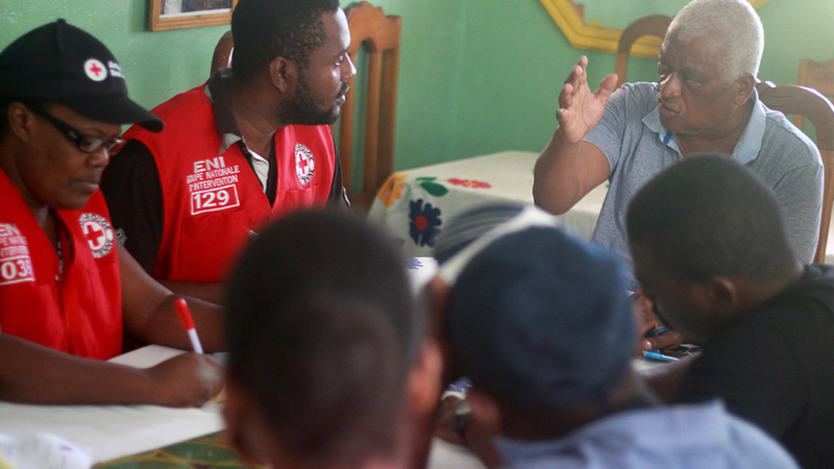
The French Romanticist Victor Hugo famously wrote that “Nothing is stronger than an idea whose time has come.” The localization of humanitarian aid is one such idea.
Over the past 18 months, this idea — that more resources, authority and capacity should be devolved to local and national humanitarian actors — has moved from the fringes of our sector, to the heart of the “Grand Bargain” agreed between donors and international organizations last year. While it is good that it is in the full view of donors, it should not stop there. Discussions on the “new way of working” — which seem to be the post-World Humanitarian Summit follow-up item gaining traction — must continue putting local action as the key to success.
It is undeniable that nearly all humanitarian aid that is currently delivered in major crises comes through the hands of local volunteers, local civil service organizations, and community groups in affected countries. Organizations such as the United Nations and major nongovernmental organizations rely extensively on the local know-how, connections and community reach of local humanitarians.
In many places around the world, there would be no humanitarian action without local actors. They are the only ones consistently reaching isolated and vulnerable communities.
See related stories:
► ARC looks to improve localization in humanitarian response
► Opinion: The power of local capacity building
► Aid workers push for fast funds, local government action in Somalia drought
Yet, despite this, they have rarely been treated as equals. They typically operate project to project, with limited investment in their institutional capacity, and are too often treated as subcontractors with precious little ability to make contextual decisions.
What’s worse, they are regularly excluded from humanitarian decision-making and coordination forums that are designed for well-staffed, English speaking organizations.
Thankfully, there is now a very broad recognition of the more central role that local and national actors need to play. This has been driven in part by the widening gap between humanitarian need and available financing, and the recognition that cheaper and more sustainable approaches are needed.
Yes, localization is an idea whose time has come. But translating this into measurable outcomes on the ground is not going to be easy.
A change of this nature — and make no mistake, this speaks to fundamental change in the organization and financing of humanitarian action — will only happen if all parties work together, and if we all recognize the part we need to play. We are all part of a humanitarian ecosystem; none of us are effective without the other.
This is particularly true for the Grand Bargain commitment that at least 25 percent of international emergency funding be channeled as directly as possible to national and local actors by 2020.
International organizations have an important role to play. Global surge and technical capacity will always be needed, and there will always be disasters that overwhelm what exists at a national level. But they will need to make changes, placing much more emphasis on nurturing, supporting and adding on to the local response rather than trying to stand in for it.
International donors will also need to review how they work. Longstanding relationships with humanitarian organizations may need to be re-evaluated, as will reporting requirements that are so heavy as to make impossible for local actors to be funded.
However, donors also face real legal, political and bureaucratic constraints that need to be recognized. Some face legal barriers to direct funding for local actors and many will find it difficult, if not impossible, to directly manage and distribute grants to large numbers of them. All face political exposure from working with unfamiliar, distant partners in an atmosphere of increasing public scrutiny over public spending. We can’t pretend these constraints don’t exist. We need to help donors to find effective ways of addressing them in order for them to carry through on their good intentions.
Local actors also need to honestly accept that capacities are present but need to be predictable. This can only come with real investment in institutional building of local organizations.
Importantly, however, all stakeholders need to look beyond the financial aspect of localization. It is also about our attitude and approach over the long term to local responders.
Capacity is something that is built over time, and that depends on the sustained engagement and commitment of partners. It’s a process that is rarely linear, and never easy. I know this as well as anyone. It took me years to build my own local organization. Even when we were up and running, I could never shake the sense that our success was fragile.
We all need to take a step back and remind ourselves of what we are trying to achieve here.
Our goal was a system that could better respond to the needs of the most vulnerable. I believed then, and I absolutely believe now, that stronger and better connected local capacity is central to this. We won that argument so the shouting has to stop. Now let’s prove that we are right.
Update, June 16, 2017: This article has been updated with further analysis of the issue.
Join the Devex community and access more in-depth analysis, breaking news and business advice — and a host of other services — on international development, humanitarian aid and global health.








